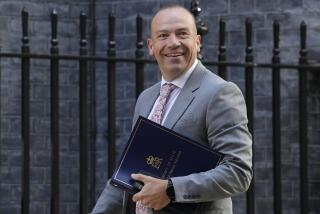Britain Takes Back Reins of N. Ireland
- Share via
LONDON — The people of Northern Ireland awoke today to find themselves under London’s rule again, their four-year attempt at power-sharing between sectarian communities suspended because Britain says continuing Roman Catholic paramilitary activity has “eroded trust” among Protestants.
And John Reid, the British Cabinet minister responsible for the province, warned that Protestant faith in the political institutions at the core of the 1998 Good Friday peace agreement will not be revived until the Irish Republican Army and its political wing, Sinn Fein, “take a definitive decision ... which gets rid of any notion they may be following a dual track of politics and violence.”
Reid’s words are an understood code for demands that the IRA declare its war with the British state over and its volunteers ready to disband. The decision to suspend the Northern Ireland Assembly and executive council comes amid new evidence that the IRA remains visibly operational, Reid said in an interview with The Times on Monday.
The sense of crisis accelerated after the province’s police force raided Sinn Fein offices at Stormont, seat of the assembly, on Oct. 4 to crack what it claims was an IRA espionage ring. Three republican activists were later arrested and charged with stealing British government mail and memorandums.
The raid spooked Protestant unionists already uneasy over the high-profile trial in Colombia of three alleged IRA members charged with aiding that country’s guerrilla movement. The IRA was also alleged to have carried out the theft in March from a police station in Belfast, the province’s capital, of names and addresses of state security officers.
Although the republican paramilitary group is no longer bombing and murdering at the terrifying rates of the 30-year “Troubles,” the latest suggestion that its activists were involved in political espionage “at the heart of government,” as unionists put it, was too serious an affront.
“You would have to be completely naive to think that a continual drip-feed of charges and allegations of this nature doesn’t instantly undermine confidence with people’s partners in power-sharing,” Reid said from Belfast.
Some unionists are also dead set against sharing power, he noted. “But the difficulty is that those enlightened sections of unionism who took the chance, who said, ‘Yes we believe the republican movement will commit themselves to politics,’ are confronted almost continually now with charges that this hasn’t happened.
“And they need reassurance.”
Reid’s solution is a well-worn tactic. The British government has suspended Northern Ireland’s government three times since the Good Friday deal was signed, all in the name of buying the parties some political breathing space and cooling tempers.
But suspension has never lasted longer than three months, and almost all observers are predicting a more protracted pause this time. One sign was Reid’s announcement that he was increasing the number of ministers responsible for running the province’s affairs from three to five, anticipating an extended period of London administration.
For his part, Sinn Fein leader Gerry Adams said Reid was promoting himself as a “referee” in the conflict when actually “we are in this situation because once again unionists threaten the institutions and Reid moved to accommodate them.”
But privately, some republicans acknowledge that they have not successfully corralled elements that are reluctant to wind down the violence.
“Given that the war is over -- though we haven’t said that -- what do people do with themselves?” said one former IRA gunrunner who is close to Adams. “People have been in this life for 30 years.”
There is little expectation among unionists that, faced with Reid’s demand for an end to violence, the IRA will swiftly comply and declare its war over.
“You have to be careful not to set the barrier to restarting power-sharing so high it can’t be cleared,” said David Ervine, leader of the Progressive Unionist Party, one of the smaller unionist parties with links to Protestant paramilitaries.
“There is an absolute lust among ordinary people for a change in paramilitary attitudes -- on both sides,” he said. “We are an abnormal, immoral society, so calling for morality in our paramilitaries is a bit of a joke. But the question is: Are paramilitaries prepared to speed up their metamorphosis from violence to politics? And I think that though there may be some dark days ahead, we’ll get there.”
More to Read
Sign up for Essential California
The most important California stories and recommendations in your inbox every morning.
You may occasionally receive promotional content from the Los Angeles Times.













